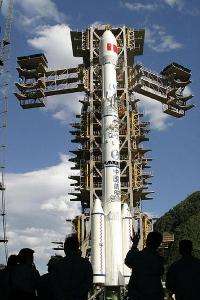December 8, 2011 report
National security expert warns of Asian space race

(PhysOrg.com) -- James Clay Moltz, an associate professor in the department of national security affairs at the Naval Postgraduate School in Monterey, California, has published a commentary paper in the journal Nature where he warns of a possible space race involving many Asian nations, possibly leading to an arms race.
Moltz writes that despite denials by the major Asian players, there exists the beginnings of a space race among the most technologically advanced countries in the area. In the lead of course is China, which besides the United States and Russia, is the only country to have put a person in space on its own. Other Asian countries actively involved in space technology include India, South Korea and Japan, though others such as Vietnam, Indonesia, Malaysia, Thailand and Taiwan are working on building a presence as well.
Japan of course, has been actively involved with the International Space station, and India has been putting nerves on edge by mixing its space technology with military goals by building rockets capable of carrying a payload all the way to Beijing. The country has also launched its own rockets into space to deliver satellites, though it’s not yet achieved the broad range of successes of the Chinese program.
The problem with an Asian space race, Moltz contends, is that it builds an arena of unhealthy competition bred out of historic geopolitical rivalries. It also wastes resources, but that’s not something that should concern other countries. What should he writes, is the possibility of an Asian space race morphing into an Asian arms race, something that could impact virtually every nation on Earth.
The current situation, he explains, is a collection of Asian countries who are unwilling to work together to meet mutual goals such as can be seen with the European Space Agency (ESA). Instead, individual countries work independently, quite often duplicating work done by other countries both in Asia and in the west, resulting in secretive programs that have as a goal beating one another to the next level, rather than building programs that serve the national, or international good.
What is perhaps most chilling about an Asian space race is the way China, which is the clear leader, has gone about its space program, highlighted not by its triumphs in manned exploration, but in it’s destruction of one of its dead weather satellites by an anti-satellite weapon back in 2007. Not only did that action contribute to the vast collection of space junk, but it sent shock waves through the entire international community as it demonstrated very clearly the types of technology China has been secretly working on. And because of its leadership role in the Asian community, the action has likely set other countries to develop their own such weapons.
One other worrisome offshoot of the space race is the impact it might have on those Asian countries unable to join in. Pakistan, for example, a country with nuclear weapons, has voiced concerns over the missile technology that India has developed and has repeatedly made it clear that any actions by India it deems a threat to its own survival would be met with all out war, including the use of nuclear bombs.
More information: Technology: Asia's space race, Nature 480, 171–173 (08 December 2011) doi:10.1038/480171a
Journal information: Nature
© 2011 PhysOrg.com

















